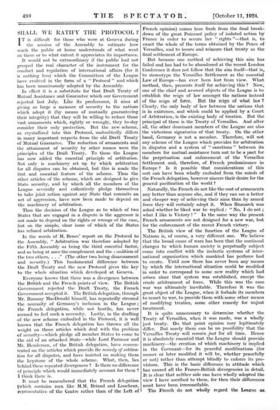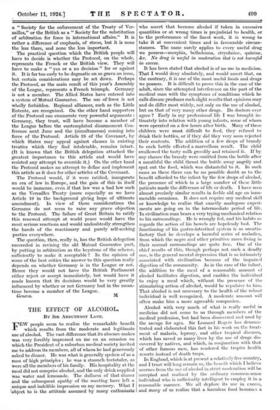SHALL WE RATIFY THE PROTOCOL?
IT is difficult for those who were at Geneva during the session of the Assembly to estimate how much the public at home understands of what went on there or to what extent it appreciates its importance.
It would not be extraordinary if the public had not grasped the real character of the instrument for the conduct and regulation of international affairs (for it is nothing less) which the Committees of the League have evolved in the form of a " Protocol " and which has been unanimously adopted by the Assembly.
In effect it is a substitute for that Draft Treaty of Mutual Assistance and Guarantee which our Government rejected last July. Like its predecessor, it aims at giving so large a measure of security to the nations which adopt it (by means of mutually guaranteeing their integrity) that they will be willing to reduce those vast armaments which, rightly or wrongly, they to-day consider their only protection. But the new scheme, as crystallized into this Protocol, undoubtedly differs in many important respects from the old Draft 'Treaty of Mutual Guarantee. The reduction of armaments and the attainment of security by other means were the principles of the Draft Treaty. To these the League has now added the essential principle of arbitration. Not only is machinery set up by which arbitration for all disputes can be obtained, but this is made the first and essential feature of the scheme. Thus the other articles of the scheme, which are designed to give State security, and by which all the members of the League severally and collectively pledge themselves to take joint action against any State that conunits an act of aggression, have now been made to depend on the machinery of arbitration.
Thus the decision of the League as to which of two States that are engaged in a dispute is the aggressor is not made to depend on the rights or wrongs of the case, but on the simple, clear issue of which of the States has refused arbitration.
In the words of M. Benes' report on the Protocol to the Assembly, "Arbitration was therefore adopted by the Fifth Assembly as being the third essential factor, and as being at once the complement and the condition of the two others. . . ." (The other two being disarmament and security.) This fundamental difference between the Draft Treaty and the new Protocol gives the key to the whole situation which developed at Geneva.
Everyone knows that there was a divergence between the British and the French points of view. The British Government rejected the Draft Treaty, the French Government accepted it. The British delegation, through Mr. Ramsay MacDonald himself, has repeatedly stressed the necessity of Germany's inclusion in the League ; the French delegation, while not hostile, has never seemed to feel such a necessity. Lastly, in the drafting of the new scheme embodied in the Protocol, it is well known that the French delegation has thrown all the weight on those articles which deal with the problem of security—which pledge all member States to come to the aid of an attacked State—while Lord Parmoor and Mr. Henderson, of the British delegation, have concen- trated on the articles which provide the remedy of arbitra- tion for all disputes, and have insisted on making them the keystone of the whole scheme. What, then, lies behind these repeated divergences ? Is there no difference of principle which would immediately account for them ? I think there is.
It must be remembered that the French delegation (which contains men like M.M. Briand and Loucheur, representative of the Centre rather than of the Left of French opinion) comes here fresh from the final break- down of the great Poineare policy of isolated action by France in order to secure her "rights "—that is, to exact the whole of the terms obtained by the Peace of Versailles, and to insure and reinsure that treaty as the final settlement of Europe.
But because one method of achieving this aim has failed and has had to be abandoned at the recent London Conference it does not follow that the aim itself—that is, to stereotype the Versailles Settlement as the essential Law of Europe—has ever been lost from view. What method, then, presents itself for achieving this ? Now, one of the chief and avowed objects of the League is to establish the .reign of law amongst the nations instead of the reign of force. But the reign of what law ? Clearly, the. only body of law between the nations that is in existence, and which could be applied by a Court of Arbitration, is the existing body of treaties. But the principal of these is the Treaty of Versailles. And after all, the other dominant members of. the League are also the victorious signatories of that treaty. On the other hand, Germany is not a member, Therefore, will not any scheme of the League which provides for arbitration in disputes and a system of " sanctions " between its members for mutual assistance turn out to be a pact for the perpetuation and enforcement of -the Versailles Settlement and, therefore, of French predominance in Europe ? Is it possible that considerations of this sort can have been wholly excluded from the minds of the French delegation, however sincere their desire for the general pacification of the world ?
Naturally, the French do not like the cost of armaments any better than anyone else, and if they can see a better and cheaper way of achieving their aims than by armed force they will certainly adopt it. When Bismarck was asked whether he liked war he replied : "No, I do not ; what I like is Victory ! " In the same way the present French armaments are not designed for a new war, but for the enforcement of the recent French victory.
The British view of the function of the League of Nations is, of course, a very different one. We believe that the broad cause of wars has been that the continual changes to which human society is perpetually subject come into conflict with the inelastic systems of inter- national organization which mankind has perforce had to create. Until now there has never been any means by which the international situation could be modified in order to correspond to some new reality which had arisen since that system was established, except the crude arbitrament of force. While this was the case war was ultimately inevitable. Therefore it was the great object of the League, when it forbade its members to resort to war, to provide them with sonic other means of modifying treaties, some other remedy for unjust treatment.
It is quite unnecessary to determine whether the Treaty of Versailles, when it was made, was a wholly just treaty. On that point opinion may legitimately differ. But surely there can be no possibility that the Versailles Treaty will remain just for all time. Hence it is absolutely essential that the League should provide machinery—the creation of which machinery is implied in the Covenant—for its peaceful modifications (for sooner or later modified it will be, whether peacefully or not) rather than attempt blindly to enforce its pro- visions. This is the basic difference in attitude which has caused all the Franco-British divergencies in detail. It is clear that neither side can have wholly adopted the view I have ascribed to them, for then their differences must have been irreconcilable.
The French do not wholly regard the League as., a "Society for the enforcement of the Treaty of Ver- sailles," or the British as a "Society for the substitution of arbitration for force in international affairs." It is rather a difference of emphasis, of stress, but it is none the less there, and none the less important.
• The practical question which the British people will have to decide is whether the Protocol, on the whole, represents the French or the British view. They will have to make a "yes or a no decision" for or against it It is far-too early to be dogmatic on so grave an issue, but certain considerations may be set down. Perhaps• the Protocol, as the main result of this year's Assembly of the League, represents a French triumph. Germany is not a member: The Allied States have entered into a system of Mutual Guarantee. The use of force is not wholly forbidden. Regional alliances, such as the Little Entente, are recognized. On the other hand supporters of the Protocol can enumerate very powerful arguments : Germany, they trust, will have become a member of the Leagne before the contemplated disarmament Con- ference next June and the (simultaneous) coming into force of the Protocol. Article 19 of the Covenant, by which States may appeal against clauses in existing treaties which they find intolerable, remains intact. (It is known that the British delegation attached the greatest importance to this article and would have resisted any attempt to override it.) On the other hand the Protocol makes no attempt to define and implement this article as it does-for-other articles of the Covenant.
The Protocol would, if it were ratified, inaugurate an era of law in Europe, and the gain of this in itself would be immense, even if that law was a bad law such as the Versailles Treaty (more especially as we have Article 19 in the background giving hope of ultimate amendment). In view of these considerations the Germans do not seem to raise any grave objection to the Protocol. The failure of Great Britain to ratify this renewed attempt at world peace would have the most serious -reactions and would undoubtedly strengthen the hands of the reactionary and purely self-seeking parties everywhere.
The question, then, really is, has the British delegation succeeded in revising the old Mutual Guarantee pact, by putting in arbitration as the keystone of the scheme, sufficiently to make it acceptable ? In the opinion of some of the best critics the answer to this question really depends on whether Germany is in the League or not. Hence they would not have the• British Parliament either reject or accept immediately, but would have it made known that its decisions would be very greatly influenced by whether or not Germany had in the mean- time become a member of the League.











































 Previous page
Previous page